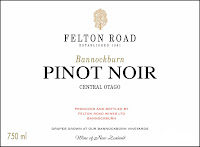Felton Road, located in Bannockburn in the Central Otago region of New Zealand, is a wholly biodynamic estate producing highly acclaimed Pinot Noir, Chardonnay and Riesling. The most-southern wine-growing region in the world, Bannockburn has a distinctive, semi-continental climate found nowhere else in New Zealand. Located the furthest inland one can be in New Zealand, it is one of the hottest, coldest and driest regions in the country. These extreme conditions impart a unique flavor profile on the grapes grown in the region. To emphasize that profile, Felton Road takes a “hands-off” approach in the winery, resulting in wines that demonstrate depth and complexity, with considerable personality and elegance.
Founded in 1991, Stewart Elms researching the most warmest blocks in the Central Otago. He purchased 12 hectares(30 acres) and planted Chardonnay, Riesling, Sauvignon Blanc & Pinot Noir. In 1996 Elms hires his buddy Blair Walter as winemaker & the rest is history.
 |
| Vineyards at Felton Road |
Their first vintage release in 1997, the winery was named "Best New Winery" & "Pinot Noir of the Year" by the international critics. Over the years, Felton Road has grown to have 18 different Pinot Noir clone types & rootstocks. In 2006 they became Certified Bio-Dynamic(vineyards have been organically grown since 2002).
Central Otago is New Zealand’s only wine region with a continental — rather than maritime — climate, which results in greater daily and seasonal shifts in temperature.
Bannockburn
 |
| Central Otago |
 |
| Gravity-Flow Winery |
Felton Road built a three-level, gravity-flow winery into the hillside in time for the 1997 harvest. Winemaker Blair Walter designed the production areas to ensure the gentlest possible handling of grapes. Inspired by various wineries in California, Oregon and Burgundy, Blair integrated modern techniques with the rustic simplicities of traditional Burgundian cellars and cuveries.
2010 Pinot Noir, Bannockburn Central Otago
A blend of 13 vineyard blocks throughout the Elms Vineyard on the Estate is the Winery's best reprensentation of what a great Pinot Noir from New Zealand can be!
 |
| 2010 Pinot Noir Label |
The gravity-flow winery enabled the grapes to be gently destemmed directly into open-top fermenters without pumping, with approximately 20 percent kept as whole clusters. Traditional fermentation with a moderately long maceration on skins extracted good color and tannin with considerable depth of flavor. This wine was aged for 11 months in French oak barrels. This wine was fermented with indigenous yeast and was not fined or filtered.
A nose of dusty floral aromas of predominantly pink roses and violets integrates seamlessly with Asian spices of cinnamon and clove. The palate opens softly, expressing similar floral character and adds fresh berries and a pleasing seam of minerality. Mouth-coating, but never cloying, it is subtle and caressing; a wine of harmony, restraint and sophistication that insinuates rather than shouts its breeding. It finishes with enough tannin to frame the wine neatly.
For those of you interested in hunting this wine down, ask you local retailer for information. The production is very small. The wine is shipped in 6 pack cases and would retail in the mid $50's. A real Pinot lover's wine!

No comments:
Post a Comment